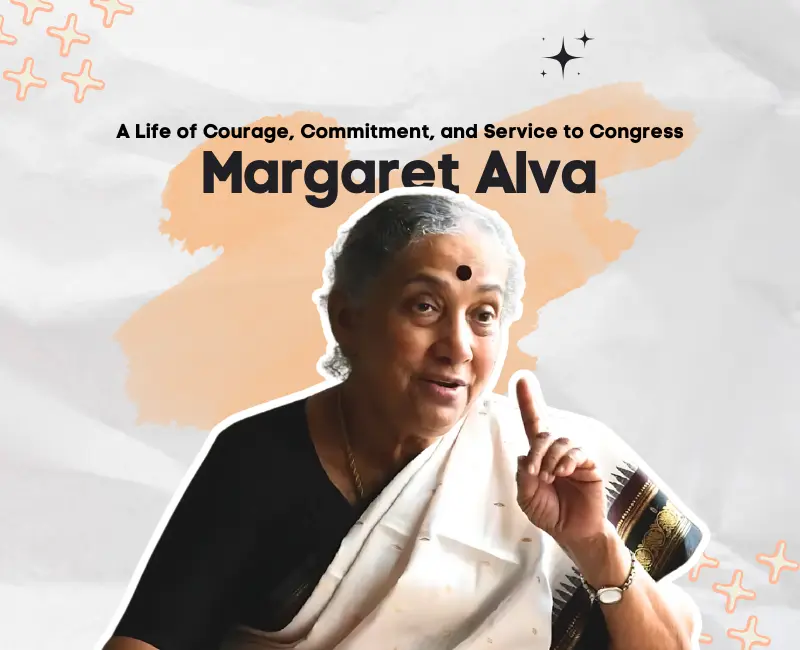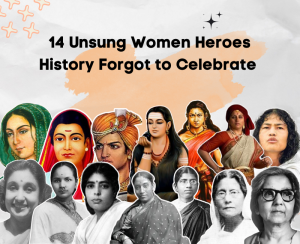Margaret Alva: A Life of Courage, Commitment, and Service to Congress

Margaret Alva, a name synonymous with resilience, political acumen, and unwavering commitment, has been an integral part of Indian politics for decades. With a career spanning over 40 years, she has etched her place in the history of the Indian National Congress (INC), contributing significantly to its growth and navigating its turbulent times. As a former Vice President of India, a dedicated public servant, and a fierce advocate for women’s rights and empowerment, Margaret Alva’s life is one of remarkable courage, profound dedication, and deep-rooted values.
Early Life and Family
Margaret Alva was born on April 14, 1942, in Mangalore, a coastal city in Karnataka, India, into a well-educated and progressive Christian family. Her father, a prominent lawyer, and her mother, an educator, instilled in her the values of intellectual curiosity, equality, and social justice from an early age. Growing up in such an environment, Margaret was always encouraged to pursue her interests and strive for excellence, regardless of the challenges she might face as a woman in a male-dominated society.
Her early years were shaped by the ethos of public service. Her family’s commitment to education and the betterment of society laid the foundation for her future career in politics. The Alva household was always filled with intellectual discussions, as her parents were passionate about the role of education in social reform and nation-building. Margaret’s exposure to these values during her formative years inspired her to pursue a path that would allow her to serve the public.
The influence of her mother, who was a teacher, was particularly profound. Margaret saw firsthand the transformative power of education and the ability to uplift others through learning. This sense of purpose would later define much of her political career, as she would consistently advocate for education, particularly for women and marginalized communities.
Margaret’s family also maintained a deep sense of community, and their home often hosted guests from various walks of life, including politicians, social activists, and intellectuals. These interactions helped young Margaret form a clear understanding of the importance of public service and the challenges involved in addressing societal inequalities. Her early exposure to such a diverse range of perspectives played a pivotal role in shaping her worldview and political leanings.
Her parents’ emphasis on discipline, hard work, and the pursuit of justice became guiding principles in her life. From a young age, Margaret Alva demonstrated an affinity for leadership and an innate understanding of the world around her, which would later propel her into the world of politics.
Education and Higher Studies
Margaret Alva’s educational journey was as exceptional as her political career. After completing her early schooling in Mangalore, she moved to Bangalore for her higher education. She attended the prestigious St. Joseph’s College in Bangalore, where she earned a degree in Arts. St. Joseph’s was known for its focus on nurturing young minds with a well-rounded education that emphasized both academic excellence and social consciousness—values that aligned perfectly with Margaret’s family ethos.
Her time at St. Joseph’s College was crucial in shaping her intellectual interests and broadening her horizons. It was here that Margaret began to develop a keen interest in political science and social issues, subjects that would later define her career. Beyond academics, Margaret was actively involved in extracurricular activities, including debates and student leadership roles, which honed her skills in public speaking, advocacy, and leadership.
After completing her undergraduate studies, Margaret Alva decided to pursue further education. She went on to complete her post-graduate studies at the University of Delhi, where she obtained a Master’s degree in Political Science. Delhi University, one of the most prominent educational institutions in India, provided her with exposure to a diverse range of ideas and perspectives, further enriching her understanding of the socio-political landscape of India.
During her time at Delhi University, Margaret was exposed to the vibrant intellectual discussions that were taking place around India’s post-independence politics. She actively engaged in debates on social justice, governance, and the rights of women and marginalized groups. It was here that she realized the power of politics as a tool for social change, and her passion for public service deepened.
Margaret Alva’s educational background laid the foundation for her political philosophy. It also helped her gain the skills needed to navigate the complexities of governance. Her academic journey gave her a comprehensive understanding of India’s political system, international relations, and social dynamics, all of which would be invaluable when she eventually entered the world of Indian politics.
Political Beginnings and Early Career
After completing her education, Margaret Alva returned to her home state of Karnataka, where she started her career as a public servant. Although initially not drawn into politics, Margaret’s passion for social issues soon led her to the Indian National Congress (INC). She was drawn to the party’s ideals of secularism, democracy, and social justice.
In the early stages of her political career, Margaret worked on the ground, connecting with the local communities, especially in rural Karnataka. Her background in education and political science allowed her to understand the challenges faced by the people, and she focused on addressing issues such as poverty, women’s rights, and access to education.
In 1972, Margaret was appointed as the General Secretary of the Karnataka Pradesh Congress Committee. This role allowed her to make significant contributions to the party at the state level, and it helped her build a network of allies and supporters. Margaret’s hard work and dedication to public service soon caught the attention of the leadership within the Congress Party, and she was nominated to represent Karnataka in the Rajya Sabha in 1992. This was the beginning of a long and fruitful career in Indian politics.
Margaret’s early career as a politician was marked by her focus on social justice and empowerment. She worked tirelessly for the rights of women, the poor, and other marginalized communities, often speaking out on issues that many were too afraid to address. Her work in Karnataka, coupled with her strong advocacy for women’s rights, earned her respect within the Congress Party and among the public.
As she gained experience and political acumen, Margaret Alva’s reputation as a principled leader grew. She became known for her intelligence, her ability to unite people across political divides, and her unwavering commitment to the Congress Party’s ideals. Her early career laid the groundwork for the leadership roles she would take on later, both within the party and in the government.
Rise Within the Congress Party
By the late 1990s, Margaret Alva had established herself as a prominent figure in Indian politics. She held various important positions within the Congress Party, including Minister of State for Youth Affairs and Sports. In this capacity, she worked to improve infrastructure for sports and youth development, recognizing the importance of youth participation in the nation’s progress. Her tenure in the Ministry was marked by a focus on sports education and creating opportunities for young talent to thrive.
Margaret’s rise within the party continued in the following decades, with her appointed roles in the Indian Parliament, both in the Rajya Sabha and the Lok Sabha, allowing her to contribute to national debates on governance, gender equality, and social welfare.
Margaret Alva: Vice President of India
One of the most significant chapters in Margaret Alva’s career was her election as the Vice President of India in 2022. Her election was a testament to her leadership skills and the high regard in which she was held by the Indian public and political circles. As Vice President, Alva’s role was critical in shaping the discourse around national policies and strengthening the democratic process in the country. She was a strong advocate for the protection of human rights, the empowerment of marginalized groups, and the promotion of education and gender equality.
Alva’s tenure as Vice President saw her engaging with key issues such as India’s role on the global stage, national security, and the country’s growing economy. Her sense of duty and commitment to the nation’s progress were evident in her every action, whether in her public speeches or her role in administrative functions.
Courage and Commitment: Margaret Alva’s Leadership
The phrase “Courage and Commitment” has been used repeatedly to describe Margaret Alva, and rightly so. Her leadership style is built on these two cornerstones—courage to stand by her principles, even in the face of adversity, and a deep commitment to the well-being of the country and its citizens.
Throughout her political career, Margaret Alva has faced many challenges, both from within her party and from opposition forces. However, her resilience and ability to stay true to her values have earned her respect from even her fiercest critics. Alva has never shied away from speaking out on issues she believes in, even when it was politically inconvenient. Her outspokenness and determination have made her a key figure in Indian politics, one whose views continue to carry weight.
One of the defining moments of Margaret Alva’s career came when she openly defended Sonia Gandhi, the former President of the Congress Party, during a time of intense political pressure. Alva’s support for Gandhi, both publicly and privately, exemplified her loyalty to her party and her belief in standing by one’s allies in times of need.
Margaret Alva and Sonia Gandhi: A Bond of Respect
Margaret Alva’s relationship with Sonia Gandhi is often seen as one of mutual respect and understanding. While they belonged to different generations, their shared commitment to the Congress party and its values created a strong bond between them. Alva was one of the earliest Congress leaders to support Sonia Gandhi when she assumed leadership of the party.
Alva’s respect for Sonia Gandhi has always been evident. She has frequently spoken about how Sonia’s leadership steered the Congress party through turbulent political waters and helped it regain its influence in Indian politics. Alva’s unwavering loyalty to Gandhi, coupled with her ability to maintain her political independence, made her an important ally for the Congress party and a key player in its inner workings.
Advocacy for Women’s Rights
A significant aspect of Margaret Alva’s legacy is her tireless advocacy for women’s rights. Throughout her career, she has championed policies that support the empowerment of women, focusing on issues like education, healthcare, and gender equality. As a politician, Margaret Alva worked to ensure that women had a more significant presence in the decision-making process, both at the local and national levels.
Her commitment to women’s issues is also reflected in her autobiography, “Courage and Commitment,” where she writes about the challenges she faced as a woman in Indian politics. Alva’s story serves as an inspiration for young women aspiring to pursue careers in public service, as it demonstrates that with determination and hard work, barriers can be broken.
Margaret Alva’s Book and Autobiography
Margaret Alva’s autobiography, Courage and Commitment, is an insightful account of her personal and political journey. The book offers readers a glimpse into the experiences that shaped her political outlook and her views on governance. From her early life in Karnataka to her rise in the Congress party, the autobiography sheds light on the challenges and triumphs that defined her career.
In her book, Alva also discusses the importance of family, faith, and values in shaping her identity. Her writing offers a candid and introspective look at the complexities of being a woman in a male-dominated political environment and provides inspiration for future generations of women leaders.
Conclusion
As Margaret Alva continues to contribute to Indian politics, her legacy remains one of courage, dedication, and service. From her humble beginnings to becoming a prominent leader of the Congress party and later the Vice President of India, Margaret Alva’s story is one of perseverance, resilience, and the enduring power of commitment to a cause greater than oneself.
Her journey is a reminder that leadership is not just about power but about the ability to inspire change, uplift the marginalized, and stand firm in the face of adversity. As India continues to evolve, Margaret Alva’s legacy will undoubtedly inspire future generations of leaders committed to making a difference in society.


